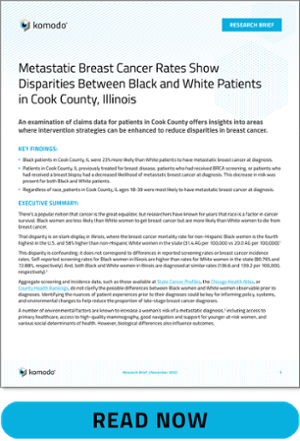Metastatic Breast Cancer Rates Show Disparities Between Black and White Patients in Cook County, Illinois

Authors: Usha Periyanayagam, MD, MPH, Head of Clinical Product and RWE, Komodo Health, and Alex Enrique, Healthcare Data Analyst, Komodo Health
A new analysis explores the race-based differences in breast cancer outcomes in Cook County, as age and screening play discernible — but not explanatory — roles in risk.
 Early screening is vital to ensure positive outcomes for those diagnosed with breast cancer. But for Black women in Cook County, Illinois, that might not be enough.
Early screening is vital to ensure positive outcomes for those diagnosed with breast cancer. But for Black women in Cook County, Illinois, that might not be enough.
While self-reported screening rates are higher for Black women than for White women in the state, and although both groups have similar diagnosis rates, the mortality rate for Black women with breast cancer in Cook County is 58% higher than for non-Hispanic White women. This remains true even after controlling for differences in variables like cancer subtype and age — Black women are more likely to be diagnosed with more aggressive forms of the disease, earlier in life.
Retrospective research that reliably evaluates race-based differences is often limited by challenges in the collection and analysis of timely, real-world data, and by how quickly that data can be turned into actionable, impactful insights. Using Komodo’s Healthcare Map™ — the industry’s largest and most complete database of de-identified, real-world patient journeys — analysts sought to add to the understanding of race-based risks in metastatic breast cancer diagnoses in Cook County while also exploring the role of several risk factors in metastatic status.
For this analysis, Komodo Health analyzed more than 8,000 patient journeys of women with metastatic breast cancer in Cook County to identify the presence of certain risk factors leading up to a metastatic diagnosis, as well as any other discernible differences or commonalities among risk groups.
Our analysis found that Black women in Cook County were 23% more likely to have metastatic breast cancer at the time of diagnosis than White women. This echoes what is seen in most cancers, where Black individuals are diagnosed at later stages of cancer (when treatments are both less effective and more extensive) than White individuals.
For those patients who had received recent breast disease treatment, breast biopsy, or BRCA screening, we found that these procedures were clearly associated with a decreased likelihood of metastatic breast cancer at diagnosis. Patients who had fibrocystic breast disease or fibroadenoma, for example, were 32% less likely to have metastatic cancer at diagnosis.
Interestingly, age also presented itself as a risk factor in metastatic cancer rates — regardless of race, patients ages 18–39 were the most likely to have metastatic breast cancer at diagnosis, and patients 50 years and older were the least likely (the younger group being 62% more likely than the latter). Evidence from these real-world patient experiences could make an argument for a reexamination of critically important screening guidelines.
This analysis expands upon previously published literature that quantified racial disparities among Cook County breast cancer patients. Quality screening, early detection, and timely diagnosis and treatment are key to favorable outcomes, but furthering our understanding of social and systemic racism and other compounding root causes of these gaps is critical. These findings reiterate that there are opportunities to reduce metastatic diagnoses and race-based disparities, especially in younger women who are at the highest risk. In using the most comprehensive, longitudinal, real-world evidence to power analyses by the most cutting-edge software platform for health data analytics available, we can generate actionable insights that would be otherwise time-consuming, labor-intensive, or cost prohibitive for patient and advocacy organizations. In Komodo Health’s mission to reduce the burden of disease, we will continue to use our tools to elucidate, quantify, and understand today's most pressing and complex health issues.
Read the full research brief here.
Learn how late diagnosis and delayed treatment result in worse outcomes for Black patients with colorectal cancer and kidney disease in Komodo Health’s analyses, done in partnership with BLKHLTH.
To see more articles like this, follow Komodo Health on Twitter, LinkedIn, or YouTube, and visit Insights on our website.





